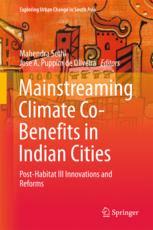

Most ebook files are in PDF format, so you can easily read them using various software such as Foxit Reader or directly on the Google Chrome browser.
Some ebook files are released by publishers in other formats such as .awz, .mobi, .epub, .fb2, etc. You may need to install specific software to read these formats on mobile/PC, such as Calibre.
Please read the tutorial at this link: https://ebookbell.com/faq
We offer FREE conversion to the popular formats you request; however, this may take some time. Therefore, right after payment, please email us, and we will try to provide the service as quickly as possible.
For some exceptional file formats or broken links (if any), please refrain from opening any disputes. Instead, email us first, and we will try to assist within a maximum of 6 hours.
EbookBell Team

4.4
12 reviewsThis volume presents a novel framework to understand urban climate co-benefits in India, that is, tackling climate change and achieving sustainable development goals in cities. It utilizes methods and tools from several assessment frameworks to scientifically evaluate sector co-benefits for informed decision making. The co-benefits approach can lead to significant improvements in the way societies use environmental resources and distribute their outputs. The volume discusses four main themes: (1) Concepts and theories on cities and climate co-benefits; (2) Contextualizing co-benefit issues across spatial scales and sectors; (3) Sectoral analyses of co-benefits in energy, transport, buildings, waste, and biodiversity, and (4) Innovations and reforms needed to promote co-benefits in cities. The discussions are based on empirical research conducted in Indian cities and aligned with the international discourse on the 2030 UN Development Agenda and New Urban Agenda created at the UN-Habitat III in 2016. The analyses and recommendations in this volume are of considerable interest to policy experts, scholars and researchers of urban and regional studies, geography, public policy, international development/law, economics, development planning, environmental planning, climate change, energy studies, and so on.